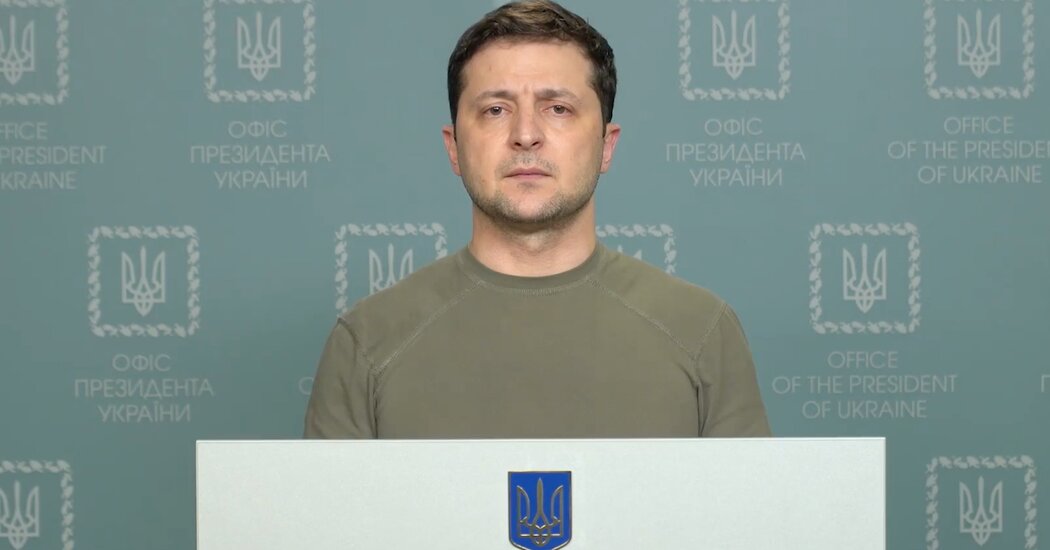
KRAMATORSK, Ukraine — By the time she had packed her important documents, some clothes and a spare tire, and said goodbye to her dog, Maryna Danyliuk could tell the fighting was in the streets of her hometown.
She and her husband sped along side streets to pick up a friend, then headed for the highway. And she caught a glimpse of what appeared to be the aftermath of a pitched street battle: two destroyed Russian armored vehicles.
“I didn’t think they would come,” she said of the Russians. “I didn’t believe it until the last moment.”
By early afternoon, Ms. Danyliuk’s gray Volkswagen Golf and its three occupants were out on the highway, joining tens of thousands of other cars heading west. Traffic snarled the roads, sometimes bringing movement to a crawl in the midst of bucolic farm fields. Ukrainian Army convoys, many carrying pontoon bridges, clogged roads. Ambulances sped both ways.
At one point, a convoy of gigantic grain harvesters rumbled along, as farmers — or maybe their creditors — rushed to move the valuable vehicles ahead of the Russian advance. In towns along the route, block-long lines of people stood waiting for A.T.M.’s or to get into grocery stores.
Gas was almost unobtainable; cars lined up for hundreds of yards at every station. As the sun set over the flat farmland, Ruslan Kalashnik, 24, stood beside his car at a gas station on the highway around sunset, his face pinched with worry.
“We are evacuating,” he said, “like everybody here.”
He awoke on Thursday to two thunderous explosions near his apartment in Kramatorsk, the city that serves as the seat of government in the portion of the Donetsk region controlled, for now, by Ukraine. He heard jets overhead.
What set him, his sister and his mother in motion, however, was a furtive, illegal cellphone call from his father, a soldier in the Ukrainian Army at the front, who met the onslaught first in an intensive shelling. He made clear that the invasion was on.
“He said, ‘Get out now.’ And that’s all the time he had to speak,” Mr. Kalashnik said. “We haven’t heard from him since.”
Just over the few hours out on the road, he said, he was dizzied by the fast-moving military action that seemed to be reshaping his country, minute by minute.
“Just while we drove, so much has changed,” he said.
Along the way, he said, he called his grandmother living near the Russian border to the south of Kharkiv, an eastern Ukrainian city that was partially surrounded Thursday. Russian soldiers had already arrived, he said she had told him, and added, “There is a tank in my garden.”
Ms. Danyliuk, a 65-year-old retiree, and her husband, Bogdan, lived in Shchastya, a town along the line dividing government territory from a separatist enclave in eastern Ukraine, where she was an active volunteer in a theater group for children. She also awoke Thursday to a bombardment.
“We packed in a panic,” she said in a telephone interview from the road. “I was afraid to turn on the light. I decided to take a shower, while I had a chance. We packed documents. But I didn’t bring the family photographs. They were in a big box. There wouldn’t be room for them.”
She said she later regretted that decision. In the end, she took another spare tire.
“I should have left yesterday,” she said. “Today, I abandoned everything and left.”
She was planning to stay with her son in Kyiv, though he lives in a one-room apartment, but she also understood Kyiv was not safe, either. Before they left, she and her husband scattered some feed on the ground for their chickens, and then let the birds out to roam — perhaps, into the street fighting.
And at the last moment, in one small tragedy on a day with many of them, Ms. Danyliuk knelt and hugged her dog, Muvi, a mutt she had enjoyed walking in the pine forests around their home.
“I hugged Muvi and I cried,” she said. The dog would be on its own now.




